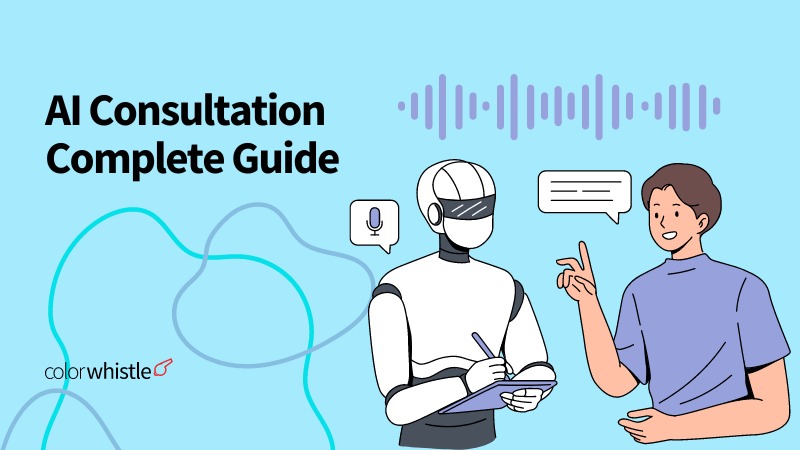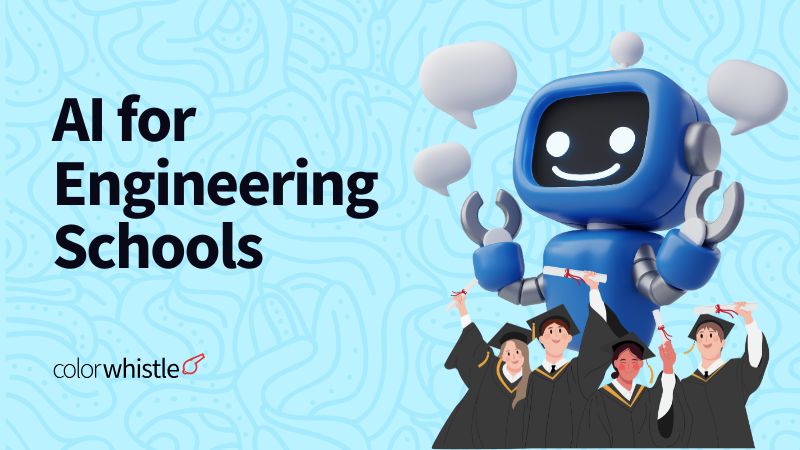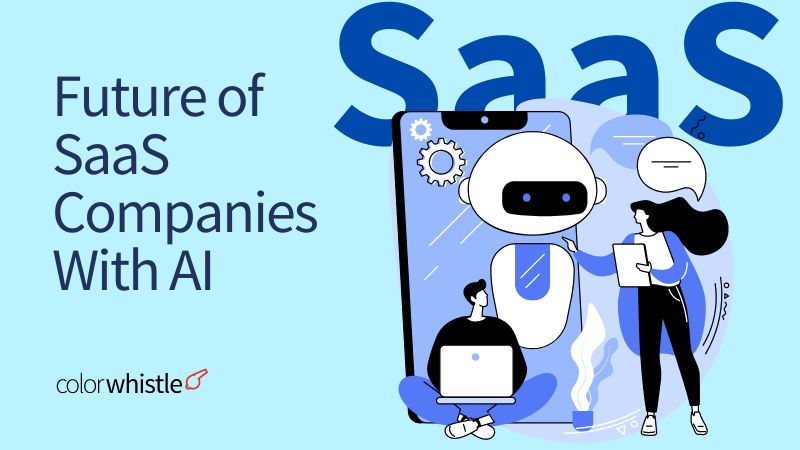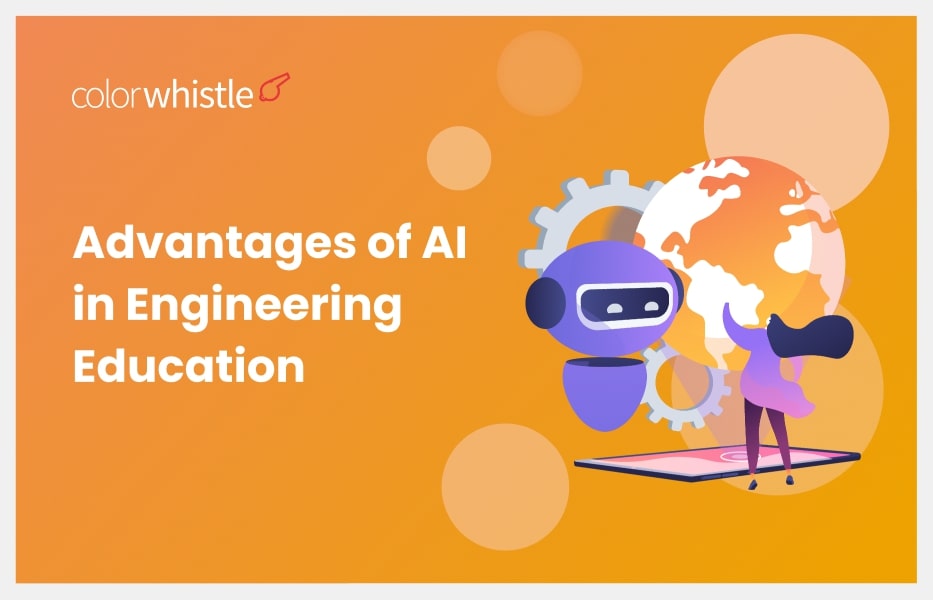Imagine a world where robots understand your sarcasm, algorithms write your next bestselling novel, and your toaster predicts your existential crisis before you do. No, it’s not a fever dream fueled by expired cheese puffs – it’s the dawn of the AI revolution.
Navigating the AI maze can be trickier than solving a Rubik’s Cube blindfolded, that’s where an AI consulting service agency comes in.
What is AI Consulting?
AI consulting refers to seeking expert guidance and advice to utilize artificial intelligence (AI) effectively within a business or organizational framework. It involves collaborating with professionals specialized in AI to assess, strategize, and implement AI solutions customized to specific business needs. Consultants analyze existing systems, identify opportunities for AI integration, and develop a roadmap for successful implementation, ensuring businesses make informed decisions and optimize AI technologies for growth and efficiency.
A Complete Guide to AI Consultation
AI consultation is more than just a service; it’s a strategic partnership between experts and businesses. It’s all about working with smart advisors who understand your business needs. Together, you figure out how to bring in AI in a way that fits your goals.
Did You Know?
Over 50% of businesses have now implemented or are planning to implement AI
Why Does Your Business Require AI Consulting?
As businesses navigate the rapidly evolving landscape of technology, AI consulting becomes crucial to leverage the benefits of artificial intelligence for growth and efficiency. It helps businesses understand the potential applications of AI in their specific industry, identify opportunities for automation, optimize processes, and develop a strategic roadmap for implementing AI solutions. Consultants bring expertise in AI technologies and industry knowledge and customize solutions to meet the unique needs of each business.
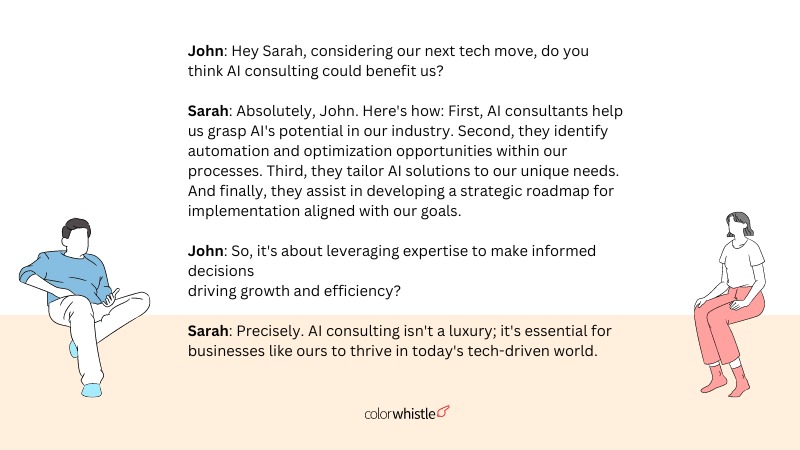
What Does the Process of AI Consulting Involve?
Here is a general framework, and the specifics of the process may vary depending on your chosen consulting firm, your business context, and the complexity of your AI projects. But by understanding these key stages, you can better navigate the AI consulting journey.
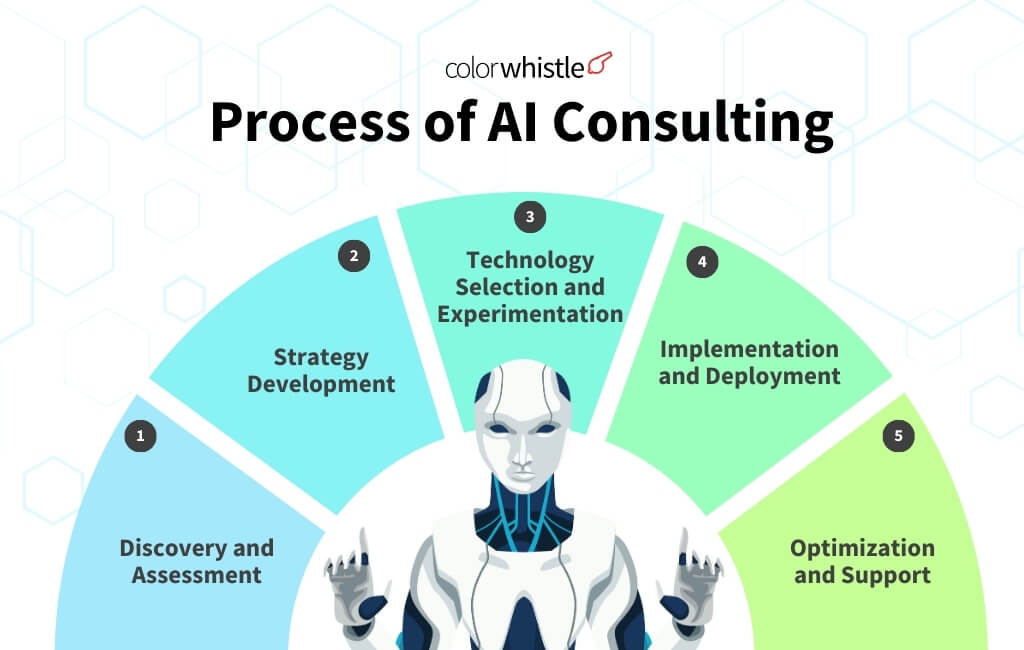
Discovery and Assessment
- Understanding your business goals and challenges: This initial phase involves a thorough evaluation of your business operations. Consultants examine existing systems, data structures, and processes to identify potential areas where AI can bring value.
- Defining your AI vision and data evaluation: They focus on understanding your specific needs, challenges, and opportunities where AI can make a significant impact. This stage helps set the foundation for a targeted AI strategy.
Strategy Development
- Creating a customized roadmap: Consultants frame a specific plan for AI implementation, considering your needs, resources, and technological readiness.
- Feasibility analysis: The proposed solutions are evaluated for practicality, potential risks, and return on investment.
- Prioritization and budgeting: You work together with the consultants to decide which AI projects will have the most significant impact and figure out how to allocate resources for them.
Technology Selection and Experimentation
- Choosing the right tools and platforms: Consultants recommend and shortlist AI tools and platforms aligned with your needs and technical environment.
- Proof-of-concept development: Small-scale prototypes are built to test the feasibility and effectiveness of proposed solutions.
- Data preparation and optimization: Data is cleaned, organized, and formatted to ensure smooth integration with the chosen AI tools.
Implementation and Deployment
- Integration with existing systems: Consultants seamlessly integrate the AI solutions into your existing workflows and infrastructure.
- Training and change management: Your team receives comprehensive training on using and managing the new AI tools and processes.
- Go-live and performance monitoring: The consultants closely monitor the initial deployment, ensuring smooth operation and addressing any emerging issues.
Optimization and Support
- Continuous improvement: Consultants provide ongoing support and guidance to optimize and refine your AI solutions over time.
- Performance monitoring and adjustments: Ongoing data analysis and feedback are used to ensure your AI solutions remain aligned with your goals and adapt to changing needs.
- Scalability and future planning: Consultants guide scaling your AI initiatives and roadmap future advancements to leverage the evolving AI landscape.
Benefits of Hiring AI Consultants
They Know Their Stuff: These experts know a lot about AI and how it works in different industries. They use this knowledge to create plans that fit your business just right.
Made-for-You Plans: They make special plans just for your business. These plans consider what you need and what your goals are, so AI can help you in the best way.
Safety First: They help keep your business safe when using AI. They make sure your data is secure, and they try to make AI fair and good for everyone.
Stay Ahead: These experts keep an eye on the coolest new AI things. They bring these ideas to your business so you can be even better than the competition.
Do Things Smarter: They help your business work better by using AI to do things faster and smarter. This helps you make better choices and come up with new ideas.
Grow Together: They stick around to help even after setting things up. They make sure your AI keeps getting better with your business, so you can keep growing.
AI Governance
AI governance involves establishing policies and procedures to ensure that AI systems are developed and used in a responsible, ethical, and transparent manner. This includes addressing issues such as data privacy, security, and compliance with regulations. According to the CNIL, the development of AI systems should be compatible with privacy issues and should adhere to ethical standards to gain the trust of citizens.
What are the Key Considerations for AI Governance?
Key considerations for AI governance include
- Ethical and Moral Implications: AI governance is essential to address the ethical and moral considerations of AI systems, as they can have significant societal consequences. This involves ensuring transparency, accountability, and respect for individual rights.
- Legal and Regulatory Compliance: AI governance is necessary to ensure compliance with legal and regulatory requirements, such as data privacy laws and fundamental principles for the responsible use of AI. It also involves providing a detailed account of how AI systems work to build and maintain trust with stakeholders.
- Risk Management and Bias Mitigation: AI governance frameworks should establish strategies to identify and mitigate biases in AI systems to prevent discrimination. They should also ensure compliance with data protection laws and establish mechanisms to continuously monitor AI systems’ performance and impact.
- Transparency and Accountability: AI governance involves providing visibility into the behavior of AI models, ongoing monitoring to ensure fairness and quality, and proactive identification and validation of potential risks before implementing AI systems.
What are the Most In-Demand Generative AI Skills and How Can They be Incorporated into the Workforce
The most in-demand generative AI skills include ChatGPT, Natural Language Processing (NLP), Tensorflow, Image Processing, Pytorch, AI Content Creation, Large Language Model (LLM), You Only Look Once (YOLO), Object Detection, Stable Diffusion, Prompt Engineering, Azure OpenAI, AI Chatbot, AI Text-to-Speech, Midjourney, and Gradio. These skills are sought after by companies looking to leverage generative AI for various applications, such as creating unique content, improving machine learning models, developing AI-powered tools, and enhancing business processes.
To incorporate these skills into the workforce, companies can take several steps, including:
- Investing in Training and Education: Providing training programs and educational resources to upskill existing employees in generative AI technologies and tools.
- Hiring Specialized Talent: Actively recruiting professionals with expertise in generative AI skills to fill specific roles within the organization.
- Collaborating with AI Communities and Forums: Encouraging employees to engage with AI communities and forums to stay updated on the latest developments and best practices in generative AI.
- Adopting AI-Powered Solutions: Integrating AI-powered tools and solutions into business processes to create practical opportunities for employees to apply generative AI skills.
- Embracing a Skills-Based Hiring Approach: Shifting towards a skills-based hiring approach to identify and attract professionals with the specific generative AI skills needed to drive business objectives
Wrap-Up
AI isn’t just about fancy technology; it’s about making amazing things happen. By using AI responsibly, teaming up with the right experts, and focusing on solutions that put people first, you can use AI to:
- Make your business work better: Make things simpler, improve decision-making, and stay ahead of the competition.
- Give customers awesome experiences: Personalize how you talk to them, help them right away, and build stronger connections.
- Be super innovative and grow a lot: Create new and amazing products, reach out to new customers, and find hidden opportunities.
The future is for those who grab onto the awesome power of AI. So, start now! Begin your AI journey, boost your team’s skills, and get ready for a ride with the perfect AI app development service company that will change your business and bring you success.
Feel free to swing by our ColorWhistle page. You’ll get the lowdown on our services and find some interesting stuff there! Just head to our Contact Us page to get in touch with us.
What’s Next?
Now that you’ve had the chance to explore our blog, it’s time to take the next step and see what opportunities await!

